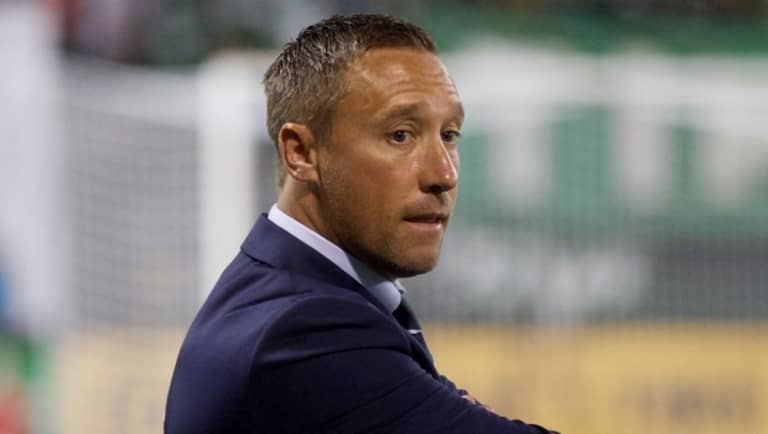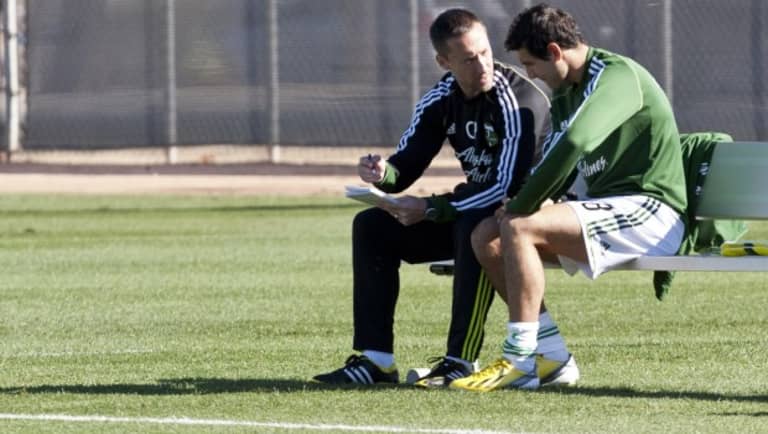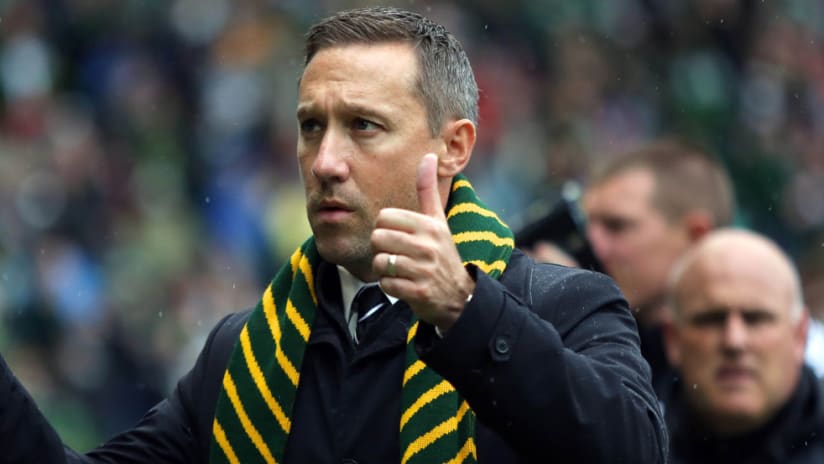Ryan Higginbotham was in London to see about a player.
Caleb Porter’s Akron men’s soccer program was still in its adolescence when Higginbotham, then Akron’s recruiting coordinator, was sent to England before the 2007 season to follow up on a tip. But as he settled into his seat to watch a trial match, his attention quickly turned to another player sharing the field with the one he’d crossed the Atlantic to scout.
Higginbotham sat entranced as this unknown player danced with balletic grace around defenders and then flipped some hidden afterburner to buzz by with sonic abandon on the flank. The player was local, and Akron knew it had a bead on him when nobody else in the United States knew his name.
Higginbotham found his phone almost immediately.
“This kid you want me to look at, he’s a good player,” Higginbotham reported. “But there’s another kid on the field that’d be the best kid in college soccer.”
That kid’s name was Steve Zakuani. Along with a dizzying cast of Zips, he helped kick-start a revolution.
There may be some onlookers in American soccer circles who view Porter’s seven seasons as Akron’s head coach from 2006-2012 as a waypoint between his precocious early years spent finding himself philosophically and his present-day title as an American coaching prodigy-in-waiting with the Portland Timbers. After all, was his time at Akron not ultimately grooming him to become the MLS coach who led the Timbers into MLS Cup in just his third year?
- ExtraTime Radio: Previewing MLS Cup, chatting with Timbers defender Liam Ridgewell
But that viewpoint is ultimately a myopic one. A deeper dissection into what made those Akron teams great is a study into the heart of good soccer for its own sake. Porter and his staff did not make Akron what it was to create job opportunities elsewhere. They did it because they were sure the game’s aesthetic demanded it.
That legend trails Porter into those hallowed Akron halls illuminated by his own accomplishments to this day. Sunday’s MLS Cup final in Columbus will bring Porter within a 126-mile drive down Interstate 76 from the Akron campus he helped fashion into a hub of fluent, attacking soccer in seven luminescent years at the rudder. In a college soccer realm too often dominated by an approach that values white-knuckles winning over style, Akron was (and remains) a city on a hill.
The Zips played a game to be watched, not just to be won. And Porter was at the center of that revolution.

When current Akron head coach Jared Embick was hired as an assistant in 2007, he immediately caught the fire Porter was lighting in the clubhouse’s braziers.
“He’s got those qualities about him that you just want to buy in to what his vision is,” Embick said. “He came in with the vision that, ‘Hey, we’re going to win national championships and become the best program in college soccer.’”
Porter took the reins at Akron from Ken Lolla, who’d spent 13 years bringing the Zips into a pattern of respectability before departing for Louisville in 2005. To replace him, Akron turned to Porter, who’d been groomed as an assistant under Indiana coaching legend Jerry Yeagley but had never been a head coach before.
Akron was a solid program known for quality if pragmatic soccer under Lolla, and they continually qualified for NCAA tournaments and won MAC championships. But they were never a true national title contender, and Porter immediately sought to alter the paradigm. His Akron teams would be different.
- Armchair Analyst: Piece by piece, Porter and Berhalter build contenders
Porter established an almost suicidal high press and patient passing game from his first season in 2006, but his philosophy didn’t begin gaining traction until his 2007 recruiting class – highlighted by Zakuani, who was electric with the Seattle Sounders before suffering a brutal leg break in 2011 – arrived on campus. That find helped turn northeast Ohio into a beacon for professional prospects. Chris Korb, now with D.C. United, was already on campus, and future pros Blair Gavin and Michael Nanchoff arrived with Zakuani.
At that point, Akron didn’t even have a style of play to sell their recruits, who had no reference point on which to judge Porter. The Zips were one name among many. Higginbotham, Embick, Porter and the rest told their recruits Akron was well on its way to becoming the best program in college soccer, not far from the shores of Lake Erie. Embodying the vision, Zakuani chose Akron sight unseen.
“When we got people on campus and they saw Steve play and blow by people, and the next thing you know you see [Anthony Ampaipitakwong] and Blair Gavin as a freshman, then it became OK to come here,” Embick said.
The pitch worked because the soccer worked. Akron won 15 games playing an attractive, if incomplete, attacking style in 2007 and made the second round of the NCAA tourney. The next year, an unknown local kid named Darlington Nagbe arrived on campus after holding fast to a commitment he’d made as a high school sophomore. New England forward Teal Bunbury came the same year almost entirely because he wanted to play with Nagbe, now a US international and star with Porter's Timbers. Houston defender Kofi Sarkodie was in the same class.
But it wasn’t until 2009 that Porter’s vision shocked college soccer to its filaments. There is a never-ending range of arguments about the best teams in college soccer history. There are Claudio Reyna’s Virginia squads of the early 1990s, the turn-of-the-21st-century Indiana teams, maybe St. Louis in the 1970s. But in modern college soccer there has been no loftier two-year run than the one enjoyed by Akron in 2009 and 2010, when a collection of future pros gathered for a squall that would tilt college soccer on its axis.
College soccer is now as jumbled as it has ever been, as evidenced by unseeded Providence and Maryland-Baltimore County making the College Cup last season. Sustaining dominance is harder than at any point in history.
And yet Porter’s 2009 and 2010 teams were so impossibly good that they earned the team’s passing style – borrowed in part from Barcelona and Porter’s pseudo-mentor Pep Guardiola – the moniker “Death by 1,000 Passes.” Akron’s 2009 roster included 13 future professionals. To put that into perspective, most programs outside a Power Five conference are happy with one or two. Those Akron teams went a combined 45-1-4 and won the 2010 national championship. To this day it’s the only national title for any Akron athletic program in history.
But Porter’s revolution was measured in far more than wins and losses.
The Akron coaching staff took a trip to Barcelona before the 2009 season and met with the famed club’s youth coaches. They could see something turning in Porter then, when the fluid but drilled passing style that was most evident in Portland in 2013 was drawn out into the open.
The 2009 team did not lose a single game in regulation or overtime all year, and it was only denied a national title in an excruciating penalty-kick shootout against Virginia. But 2010 was something to behold.
By Porter’s fourth year, Akron could point to the analytics to prove their style worked and direct recruits to the tape, to the results, to the style. After 2009, Darren Mattocks arrived from Jamaica, flanked by, among other future pros in the same class, Perry Kitchen. Akron had lost Bunbury, Gavin, Ben Zemanski and Zarek Valentin to MLS in one offseason and somehow improved.

As their possession style constricted around defenses like a snake marking its next meal, Akron mowed through opponents. Aside from one shocking defeat to nine-loss Cleveland State, Akron stormed through the postseason and downed Lolla’s Louisville 1-0 in the title game thanks to a 79th-minute goal from Scott Caldwell, another future pro. Porter had his national title.
He was already currying favor with MLS by that point as well. After Tom Soehn stepped down as D.C. United’s head coach in 2009, Porter was rumored to be in for the opening, but instead extended his Akron contract. As other colleges with household names sniffed around the young coach, Porter’s steadfast loyalty to the program endeared him to the community.
“Usually at schools like this, usually when you taste some success nationally, then you jump ship and you go to a big Power Five conference and you leave them behind,” Embick said. “He never did that. He always stayed true to his word that he’d never leave here unless it was for a professional opportunity.”
And so he did. After two more NCAA tourney appearances in 2011 and 2012, Porter took his talents to Portland, which he’s led all the way to Sunday's MLS Cup at Columbus. The program he left behind was passed to Embick, his former assistant, and the progress has kept pace. With future MLS-level talent such as Adam Najem and Richie Laryea on board, No. 4 seed Akron is currently preparing for an Elite 8 matchup against Creighton on Saturday. One more win and the Zips will be in the College Cup again for the first time since Porter’s 2010 team won it all.
It’s a heady time for soccer in Ohio. That’s never been more evident than this week, as Porter’s former world and his current one pass like ships in the night in one weekend.
“I think for Ohio and the game, there’s only two things people have talked about all week,” Embick said. “The Elite 8 game and the MLS Cup final.”













